


Luo Linquan, consul general for China at San Francisco, the United States, presents flowers to Roy Dillon, member of the "Flying Tigers" who assisted China during the war, have taken time to reflect on their experience during the War. [Photo: CRI Online]
Former members of an American volunteer group, known as the "Flying Tigers," who assisted China during the war, have taken time to reflect on their experience during the War.
92-year-old Roy Dillon and 94-year-old Wes Ament are members of the "Flying Tigers", officially known as the American Volunteer Group of the Chinese Air Force.
Since May 1942, the two veterans started to undertake flying missions over the Hump, above the Himalayan mountains.
The so-called "death route" was built to transport military supplies to China, after the last land route connecting southwest China's Yunnan and Myanmar was ruined by Japanese troops.
Dillon says the flying conditions were very difficult for them.
"The Japanese at one time had control of that (Myanmar), and that's why we had to move to fly these northern routes. And the C-47 didn't have the altitude capability or the climbing ability or the weight-carrying ability to fly these high altitudes."
The "Flying Tigers" later used the more advanced transport plane, the C-46, with a higher loading capability. But the flying conditions in the high-altitude mountainous area and hazardous weather still made the flight a challenge for pilots.
Dillon flew over the Hump 174 times and for nearly 720 hours between 1944 and 1945. He lost a lot of companions during that period.
"From June to December of 1943, 153 airplanes crashed and 186 airmen lost their lives. Altogether during the war there were 1,300 airmen lost and over 500 airplanes lost."
Wes Ament recalls that he started to fly the transport plane C-87 that was refitted from a B-24 bomber aircraft on Jan. 6, 1945 and had flown 185 hours in two months.
Ament and Dillon now live in the Calaveras County of California. Old age has prevented them from making a long journey to China, and thus they will not attend the Sept. 3 military parade in Beijing which marks the victory of World War II.
"We've already waited too long to be able to go over and participate in the celebration, but our hearts will be there."
Dillon says as small as their contribution was, it is something that they are proud of.
"We were able to contribute to the victory over the Japanese during WWII. As little as it was, it was still something that I'm proud of and Wes is proud of. We consider it a privilege to be able to contribute to that."
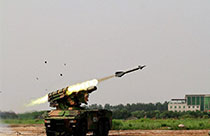 'Enemy planes' intercepted by Hongqi-7B air-defense missiles
'Enemy planes' intercepted by Hongqi-7B air-defense missiles Blind date with bikini girls in Nanjing
Blind date with bikini girls in Nanjing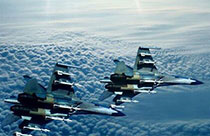 Amazing photos of Chinese fighter jets
Amazing photos of Chinese fighter jets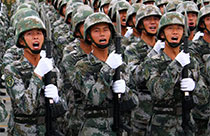 Chinese soldiers participate in training for V-Day parade
Chinese soldiers participate in training for V-Day parade Painting: Lonely women in Forbidden City
Painting: Lonely women in Forbidden City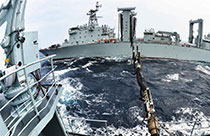 China and Russia hold joint drill in Sea of Japan
China and Russia hold joint drill in Sea of Japan 'Goddess' in Taiwan McDonald's
'Goddess' in Taiwan McDonald's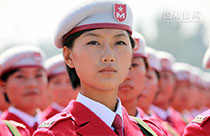 Female soldiers at military parades
Female soldiers at military parades Photos of campus belle doing splits go viral
Photos of campus belle doing splits go viral China celebrates Tibet anniversary
China celebrates Tibet anniversary Can mass protests defy Abe’s militarism?
Can mass protests defy Abe’s militarism? China’s watchdog teaches producers how to make reality shows
China’s watchdog teaches producers how to make reality shows As China’s rise alarms US think tanks, the importance of good ties must not be forgotten
As China’s rise alarms US think tanks, the importance of good ties must not be forgottenDay|Week